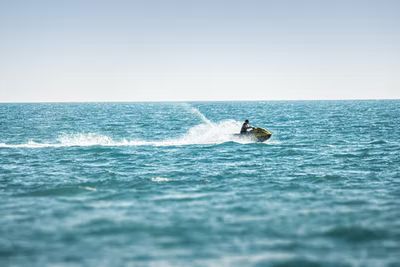Jet Ski
A jet ski rider successfully stops their vessel from crashing into some rocks by reducing the velocity uniformly from 15 m/s to 5 m/s during the first 10 m. Assuming constant deceleration, what is the total distance traveled by the jet ski before coming to a rest?

Expand Hint
$$$v^2=v_0^2+2a_0(s-s_0)$$$
where
$$v$$
is the velocity along the direction of travel,
$$v_0$$
is the velocity at time
$$t_0$$
,
$$a_0$$
is constant acceleration,
$$s$$
is the displacement at time
$$t$$
along the line of travel, and
$$s_0$$
is the displacement at time
$$t_0$$
.
Hint 2
Use the above equation to first solve for acceleration, then again for the total distance.
For constant acceleration, the equation for velocity as a function of position:
$$$v^2=v_0^2+2a_0(s-s_0)$$$
where
$$v$$
is the velocity along the direction of travel,
$$v_0$$
is the velocity at time
$$t_0$$
,
$$a_0$$
is constant acceleration,
$$s$$
is the displacement at time
$$t$$
along the line of travel, and
$$s_0$$
is the displacement at time
$$t_0$$
.
First, let’s solve for acceleration from the first 10 m scenario:
$$$(5m/s)^2=(15m/s)^2+2a(10m)$$$
$$$a=\frac{(5m/s)^2-(15m/s)^2}{2(10m)}=\frac{(25-225)m^2/s^2}{20m}=\frac{-200m}{20s^2}=-10\:m/s^2$$$
Since acceleration is constant, let’s reuse the same equation to analyze the whole picture:
$$$(0m/s)^2=(15m/s)^2+2(-10m/s^2)(x)$$$
where
$$x$$
is the total distance traveled. Therefore,
$$$x=\frac{-(15m/s)^2}{2(-10m/s^2)}=\frac{-225m^2/s^2}{-20m/s^2}=11.25\:m$$$
11.25 m
Time Analysis
See how quickly you looked at the hint, solution, and answer. This is important for making sure you will finish the FE Exam in time.- Hint: Not clicked
- Solution: Not clicked
- Answer: Not clicked
Similar Problems from FE Sub Section: Constant Acceleration
037. Motorcycle's Velocity
088. Constant Acceleration
321. Traveling Train
322. Aircraft Carrier
487. G-Force
515. Initial Velocity
635. Downhill Skiing
637. Motor Boat
Similar Problems from FE Section: Particle Kinematics
018. A Pebble on a Mountain
030. Newton's 2nd Law
037. Motorcycle's Velocity
088. Constant Acceleration
122. Roller Coasters
158. A Train's Velocity
165. Velocity Plots
313. Projectile Motion
321. Traveling Train
322. Aircraft Carrier
325. Pebble Off a Building
394. Acceleration
412. Hill Bomb
444. Electron Motion
487. G-Force
488. Block Speed
515. Initial Velocity
556. Golf Angle
635. Downhill Skiing
637. Motor Boat
658. Hockey Puck